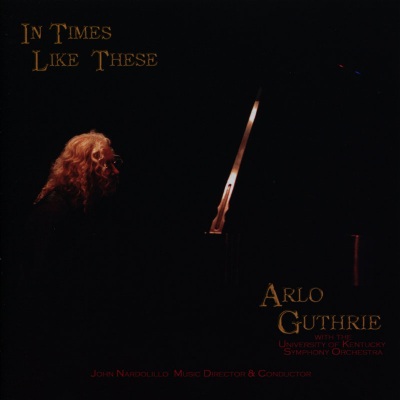
In Times Like These
by William RuhlmannIf Arlo Guthrie has always been viewed as the embodiment of a kind of starry-eyed hippie optimism only slightly undercut by a strain of black humor, there has also always been a more thoughtful, spiritual, and even somewhat gloomy side to him that has come out on some of the songs he's written for his albums. It's a less prominent aspect of his persona, to be sure, but remember that this is a man who spent most of his life not knowing whether he had a gene, passed down from his father, that would lead to the development of an incurable, fatal illness starting sometime in middle age. In Times Like These, a live album recorded with the University of Kentucky Symphony Orchestra, was released on Guthrie's 60th birthday, which made him five years older than Woody Guthrie was when he died of Huntington's disease after years of hospitalization; happily, Arlo Guthrie has been spared his father's fate. But the Sword of Damocles under which he has lived has shaped his artistic temperament. Since 1998, he has been performing his music with symphony orchestras, which may seem like an odd practice for an old folkie. But James Burton's arrangements of his songs do put an orchestra through its paces, drawing out their melancholy moods. Be warned: this is not the Arlo Guthrie of "Alice's Restaurant Massacree" or even of 2005's Live in Sydney. The singer says practically nothing on the disc, simply singing one song after another as he accompanies himself on guitar or piano and the orchestra fills out his melodies. And the songs are among his most wistfully reflective, as titles like "Darkest Hour," "Last Train," and "Last to Leave" suggest. An elaborate arrangement of the jazz/blues standard "St. James Infirmary" lightens the mood only musically; after all, it's a song about death. Guthrie dispenses with the orchestra for a single new song, "In Times Like These" itself, and as one might expect, the times he describes are anything but happy. Politicians are up to their usual evil deeds ("When leaders profit/From deep divisions") and even the music stinks ("The singers run/To where the cash is"). The only comfort to be offered is that this, too, will pass ("It's good to remember/These times will go/In times to come"). Toward the album's close, Guthrie turns more to cover material and the tone brightens somewhat, although, even when he pleases the audience with his sole Top 40 hit, "City of New Orleans," the album's overall theme is not actually altered if, for once, one listens beyond the cheery "Good morning, America" line to what the lyrics are really saying: this is a song about a train on its last legs that has only 15 riders for its 15 cars, a train that has "the disappearing railroad blues." Even "Goodnight Irene" and "Can't Help Falling in Love," which close the disc, are songs about romantic notions more desperate than enraptured. By putting his music in an orchestral form, Guthrie may have been trying to take on the mantle of Serious Composer on In Times Like These; he has succeeded at least in coming off as serious, which his fans may appreciate, as long as they don't come to the album looking for laughs.
